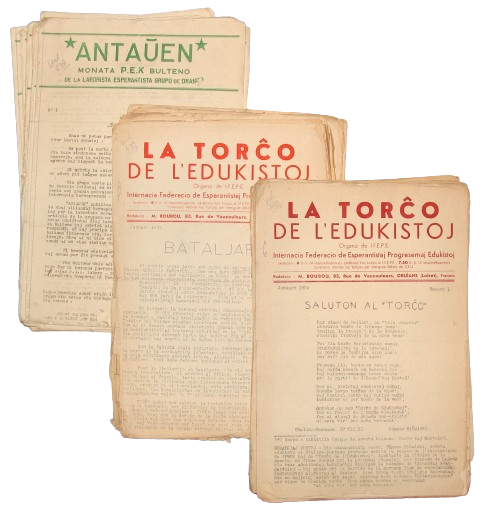1
/
of
1
IsraelPalestineHistory
Bulletin Jewish RARE 1934-36 ESPERANTO x25 France WWI Anti Fascist Articles
Bulletin Jewish RARE 1934-36 ESPERANTO x25 France WWI Anti Fascist Articles
Regular price
$438.90 USD
Regular price
Sale price
$438.90 USD
Quantity
Couldn't load pickup availability
RARE 1934-36 ESPERANTO Bulletin x25 Jewish France WWI Anti Fascist Articles
Rare! Esperanto - Large collection, about 25 issues of the monthly magazine of the Esperanto Language Association in France - 1934-1936.
Includes text on anti-fascism and against Hitler's Germany.
"La Torco De L'edukistoj" - Torch of the Educators. Published by the "International Federation of Advanced Esperanto Educators". About 15 issues from the years 1934-1935.
It is possible that these are all issues of the year since some of the booklets contain the numbering of several booklets that were attached together.
"ANTAUEN" - "Forward". Drancy, France. About 11 issues from 1936.
Good overall condition. Some wear on some of the issues at the edges of the pages.
Not all issues are photographed.
The Esperanto language was developed by Dr. Ludwig Leiser Zamenhof, a Jewish ophthalmologist from Bialystok, in the 1870s. Zamenhof intended to make the language the second language of every person in the world, alongside their mother tongue. He formulated most of the rules of grammar for the language and the construction of its initial vocabulary. The idea gained a growing community of supporters, initially mainly from the Russian Empire and later also from Central Europe, and later the idea of the language spread to other places - Western Europe, America, China and Japan. In 1905, the first Esperanto Congress was held in the city of Boulogne-sur-Mer, France. At this congress, the 'Boulogne Declaration' was adopted, which established the principles of the Fondamento de Esperanto as the permanent binding basis of the language and limited changes to its basic rules. The 1920s are considered the heyday of the language, which attracted many interested parties for various reasons. Ideological. The Nazis saw Esperanto as a project that contradicted their nationalist worldview, so they boycotted the language and gradually closed all Esperanto associations in Germany, and finally banned all linguistic or social activity in the field, in Germany and in any other territory that fell under their occupation. In "Mein Kampf," Hitler defined the international language as "a Jewish plot to take over the world." Today, Esperanto is the most widely spoken of the planned languages, with about 2 million speakers.
For condition watch photos
Share



